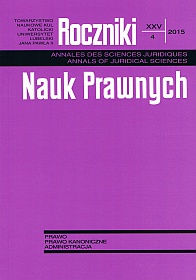Acts of Extraordinary Administration in the 1983 Code
Abstract
This paper concerns the act of extraordinary administration provided in c. 1277 and 1281 §§ 1-2. The concept “act of extraordinary administration” is a technical term used for the purpose of identifying an act of administration which exceeds the limits and manners of ordinary administration. The author clarifies that the Conference of Bishops determines acts of extraordinary administration for the diocese (c. 1277) and that for public juridical persons subject to the diocesan bishop, determination is achieved by (a) the statutes, (b) if the statutes are silent on this point – the diocesan bishop following consultation with the diocesan financial council (c. 1281 § 2). If a particular act is not determined as an act of extraordinary administration in iure universali and in iure particulari it then remains an act ordinary administration.
The legislator provides different administrative procedures to carry out acts of extraordinary administration for diocesan goods and for juridical persons subject to the diocesan bishop (e.g.parish goods). In the instance of goods belonging to the diocese, the diocesan bishop is required to obtain the consent of the finance council and the college of consultors (c.1277). The same procedure is to be applied for acts of extraordinary administration expressly provided for by the universal law or stated in the documents of foundation. In the instance of goods belonging to parish, the parish priest requires to obtain the faculty from the ordinary (c.1281 § 1).
References
Beal John: Ordinary extraordinary and something between. Administration of tem¬poral goods of dioceses and parishes, „The Jurist” 1 (2012), s. 109-129.
Brown Philip: The 1983 Code and Vatican II Ecclesiology. The Principle of Sub¬sidiarity in Book V, „The Jurist” 69 (2009), s. 583-614.
De Paolis Velasio: I beni temporali della Chiesa, Dehoniane, Bologna 1995.
De Paolis Velasio: Los bienes temporales de la Iglesia, BAC, Madrid 2012.
Demers Francis: The temporal administration of the reli¬gious house of a non-exempt, cle¬rical, pontifical institute, The Catholic University of America Press,Washington 1961, s. 64-65.
Dubiel Stanisław: Uprawnienia majątkowe Kościoła katolickiego w Polsce w świetle Kodeksu Prawa Kanonicznego z 1983 roku, Konkordatu z 1993 roku i ustaw synodalnych, Wydawnictwo KUL, Lublin 2007.
Fischer Georg: Finanzierung der kirchlichen Sendung. Das kanonische Recht und die Kirchenfinanzierungssysteme in der Bundesrepublik Deutschland und den USA, Schoe¬ningh Ferdinand Gmbh, Paderborn 2005.
Kaleta Paweł: Ordinary and extraordinary administration of ecclesiastical goods, „The Canon Law Society of Great Britain and Ireland Newsletter” 2014, nr 180, s. 48-58.
Kennedy Robert: The administration of goods, [w:] John B. Beal, James A. Cori¬den, Thomas J. Green (eds.), A New Commentary on the Code of Canon Law, Paulist Press, Mahwah 2000, s. 1483.
Kennedy Robert: The Temporal Goods of the Church, [w:] John B. Beal, James A. Cori¬den, Thomas J. Green (eds.), New Commentary on the Code of Canon law, Paulist Press, Mahwah 2000, s. 1483.
Krukowski Józef: Procedura administracyjna w prawie kanonicznym, [w:] Stanisław Wrzo¬sek (red.), Kompendium wiedzy administratywisty, Wydawnictwo KUL, Lublin 2008, s. 656.
Morrisey Francis: Ordinary and extraordinary administration. Canon 1277, „The Jurist” 48 (1988), nr 2, s. 715.
Pawluk Tadeusz: Prawo kanoniczne według Kodeksu Jana Pawła II, t. IV: Doczesne dobra Kościoła, Sankcje w Kościele. Procesy, Warmińskie Wydawnictwo Diecezjalne, Olsztyn 2009.
Renken John: Acts of extraordinary administration of ecclesiastical goods in Book V of the CIC, „Studia Canonica” 49 (2015), s. 581.
Renken John: Church Property A Commentary on Canon Law. Governing Temporal Goods in the United States and Canada, St. Paulus, Ottawa 2009.
Renken John: The statutes of a parish, „Studia Canonica” 44 (2010), s. 99-101.
Signié Jean: Paroisses et administration des biens. Un chemin vers l’autosuffisance des Églises d’Afrique, L’Harmattan, Paris 2007.
Wójcik Walenty: Dobra doczesne Kościoła, [w:] Walenty Wójcik, Józef Krukowski, Florian Lempa, Komentarz do Kodeksu z 1983 r., t. IV: Księga V. Dobra doczesne Kościoła. Księga VI. Sankcje w Kościele, RW KUL, Lublin 1987, s. 11-112.
Copyright (c) 2015 Roczniki Nauk Prawnych

This work is licensed under a Creative Commons Attribution-NonCommercial-NoDerivatives 4.0 International License.


